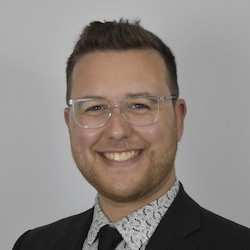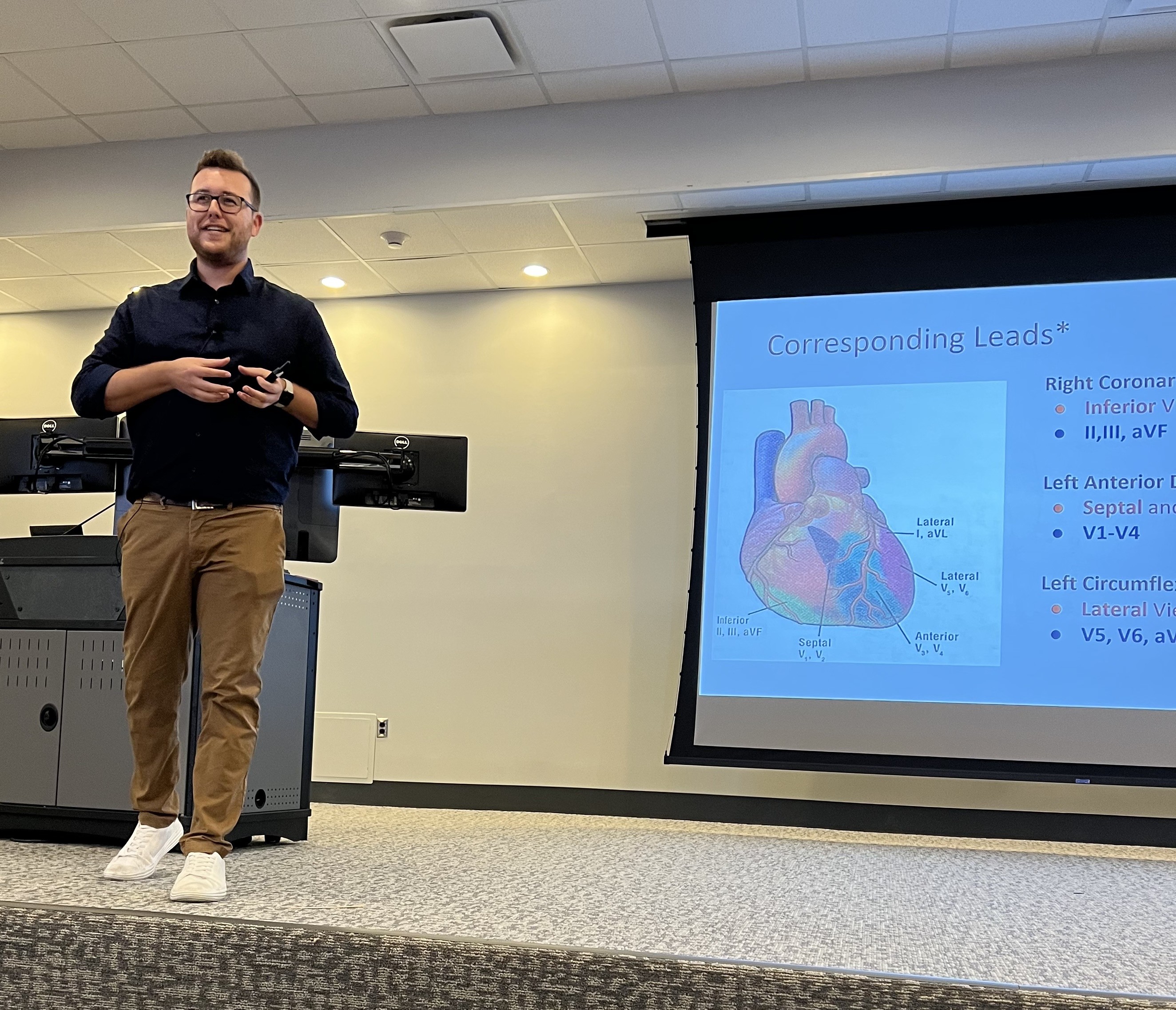A Day In The Life: Scott Landman

A Day in the Life
Scott Landman
D.O./M.S. Academic Medicine
My name is Scott Landman, a third-year medical student at NYITCOM, and I recently completed the Academic Medicine Scholar program during the 2022 year. I am from Melville, Long Island, and an alumnus of Binghamton University (2019), where I majored in integrative neuroscience and Judaic studies with a minor in education. I am a huge New York Islanders fan, and when I'm not studying, performing research tasks, or mentoring students, you can find me at UBS Arena.
Another contributor to why I chose NYITCOM was the location. My family and fiance are extremely important to me as they are my support system throughout life. The first two years of medical school were my most challenging academic experience thus far. Looking back, I know how lucky I was to have them nearby - I definitely needed them.
The Academic Medicine Scholars Program (AMSP) is a unique program, as it morphs from each class's feedback to maximize the scholars' learning opportunities. I had a different experience than those who came before me, but for a good reason. Dr. Mihlbachler, Director of the AMSP, takes feedback from scholars very seriously. The entirety of the program, however, will mostly stay the same as the program's goal is to develop physicians interested in academia, whether teaching, research, or both.
The spring and fall semesters differ to a small extent. In the spring, our responsibilities included teaching Doctor-Patient Relationship (DPR) and Osteopathic Manipulative Medicine (OMM) Lab. In DPR, we prepared cases, showcased physical exam skills on stage, and facilitated discussions with our pods for four hours a week. In addition, we had weekly DPR lab preparatory sessions where we practiced on stage and received feedback from peers. This experience and our OMM preparatory sessions provided excellent opportunities to practice receiving and professionally giving feedback. For OMM, we taught eight hours a week, and many AMSs elected to teach both first and second years. The format of OMM was such that we were assigned to be "lab leads" for a few labs throughout the year. We assisted our faculty in developing and finalizing the CPG, the timeline for the labs, and any additional learning materials (such as practice questions) for students.
OMM had additional opportunities for active osteopathic learning, such as clinical sessions with the OMM faculty, culminating in the Stanley Schiowitz case competition, usually held at the end of the year. In addition to the experience of presenting a case report to the scholar class and faculty, we got to be a part of a patient's care team, potentially for the entire year, as a scholar.
While OMM allowed a more active role in crafting the current curriculum, DPR provided a longitudinal approach to developing a DPR improvement project; there, we suggested routes to elevate the curriculum of first and second-year students. At the end of the year, we presented a few selected projects, and the faculty picked which would be implemented for the following year. It was an incredible way to leave a lasting impact at NYITCOM.
Taking more traditional classes occurs both in the Spring and Fall. My favorite class from the Spring semester was Dr. Leslie Goldstein's Methods and Research in Medical Education class. This three-hour interactive class prepared me well for a future in academic medicine. Additional traditional classes included biostatistics, epidemiology, and advanced concepts of clinical research.
In the fall, additional opportunities include teaching first-year Anatomy. There, we performed pro-sections, presented cadaveric demonstrations, and educated students on proper dissection techniques. Although a significant amount of time was spent in anatomy, this was the pinnacle of my scholar year. We spent eight hours a week formally teaching.

Another class in the fall that was uniquely valuable was academic clinical medicine. This class provided much-needed comfort in transitioning back to clinical rotations. Dr. Saggio coordinated with NUMC to allow scholars to find cases we would then present in class. Developing our patient presentations and hands-on skills in the emergency room were two of the most valuable aspects I took from that class.
Although it may seem overwhelming to schedule time around all the teaching or traditional classes, there was considerable time for world-class research. Most scholars found themselves involved in at least two research projects, which is a testament to the students' work ethics that become scholars. I had the luxury of having an incredible advisor and mentor, Dr. Aki Watanabe. His guidance and patience with my schedule allowed me to perform research during non-traditional work hours. In 2023, I will present our findings on polish crested chickens at two conferences.
I knew I wanted to be a teacher before I knew I wanted to be a physician. NYITCOM’s AMSP prepared me in more ways than I thought to be a proficient academic educator and researcher. I will apply to residency programs with a clinician educator tract, and this master's in academic medicine will be a unique distinction throughout the MATCH process.
Here is a timeline of one of my busier days in the fall! It was so rewarding but kept me busy developing my scholarly skills. I had to teach anatomy for one block in the fall (about one month) and was wrapping up a few of my research projects. Each day is vastly different (depending on research tasks, classes to teach, and traditional classes one takes), and each year is different (as Dr. Mihlbachler is an incredible listener when it comes to developing and improving the AMS program.)
6:45 AM: Wake up, say hello to my guinea pig (Pumba), brush teeth, get some coffee, and eat breakfast.
7:20 AM: Off to campus!
8-12 PM: Teach anatomy prosections and assist in first-year student cadaver dissections.
12-1 PM: Lunch in the Riland Cafe with scholars and friends.
1-5 PM: Teach OMM on stage and in pods.
5-6:30 PM: Complete research tasks.
7 PM: Get home, cook dinner with my wife, watch some TV.
9 PM: Go to bed.
NYITCOM provided exceptional colleagues and mentors with whom I will be in contact for the rest of my life. My confidence in educating patients and students stems from my training in the AMSP. If you are interested in medical education, I cannot speak highly enough about how this program will develop your skills.
I have always been interested in upper-level education. In my experience, I have grown the most from teaching others. I served as a Teaching Assistant in numerous classes during my undergraduate education. The value of educating others, I believe, can enhance one's own expertise in their field, by challenging them to answer questions they would not typically ask themselves. Working with training student doctors will keep my mind open and will challenge me to think in innovative ways. Another part of my academic medicine story is the importance of community service. Through my involvement with SOMA, I have created strong relationships with soup kitchens and religious sites on Long Island. Community outreach is important to me because giving back is the core of why I want to be a physician. The fact that academic medicine is a route to continue my involvement in these projects motivates me to continue down this path. I am currently enrolled in a program at NYITCOM where I will be receiving a Masters in Academic Medicine, on top of my doctorate in osteopathic medicine. I will use this opportunity to further my professional and educational skills, and I hope to go into academic medicine and apply for residencies associated with academic institutions.
View All >